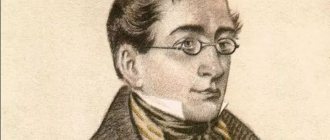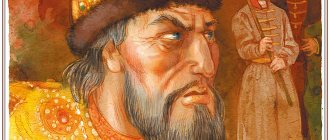In Ostrovsky's plays, the images of girls are a collective image of Russian women. A comparative description of Larisa Ogudalova and Katerina Kabanova will help you write an essay. Any person who has read the plays will agree that the heroines remain misunderstood and lonely in their worldviews until the end, and their souls do not find peace in the world, no matter how much they reach for it.
The role of love in the lives of heroines
Katerina is the main character of the play “The Thunderstorm”, and Larisa is “Dowryless”. In them, the author depicts the life of two different layers of society - the merchants and the nobility. The comparative characteristics of Katerina and Larisa prove this.
In appearance, the female characters are similar: they are both good-looking, demanding and strict, up to a certain point they adhere to strict morality, and do not allow their feelings to take over their minds. This initially saves them from making a fateful mistake.
Both girls are forced to marry an unloved man. If Katerina has to do this at the insistence of her parents, then Larisa still avoids this fate, but due to serious circumstances that lead to a tragic outcome. This is the difference in the destinies of the girls.
A comparison of Katerina and Larisa makes it clear that unhappy love becomes a turning point in their lives. They give themselves to the wrong people, and they betray their feelings. Boris turns out to be soft-hearted and does not stand up for his beloved, and Paratov is simply a scoundrel who used Larisa’s affection for his own benefit. Parents do nothing for their daughters, although both heroines indirectly die at their hands - hindsight and inattention.
Tikhon, Katerina’s husband, after her suicide, repents that he did not stand up for his wife, and Karandyshev turns out to be weak-willed, he understands that he cannot restrain Larisa and kills her. The events are symbolic because if the men had been stronger than the circumstances, both women would have been alive.
Larisa's character
Larisa Ogudalova, a dowryless woman, is very proud: she is ashamed of herself and her mother, of the beggarly lifestyle that they are forced to lead, pleasing the rich guests who come in droves to their house to look at the beautiful but poor bride. Nevertheless, Larisa tolerates these parties, despite repeated scandals in the house, which immediately become known to the whole city. However, when her feelings were affected, the heroine disdained all conventions and ran after Paratov on the day of his departure from Bryakhimov (which, by the way, like Kalinov, is located on the banks of the Volga). After returning home, the heroine continues to live her usual life and even agrees to marry Karandyshev - an unequal marriage in all respects. And if not for the reappearance of Paratov on stage, then, most likely, Larisa would have become Mrs. Karandysheva, would have gone with her husband to the village and, perhaps, after some time in the lap of nature, would have found the strength to continue leading her usual existence.
Family and environment
The environment in which the heroines grew up is also important when comparing Katerina and Larisa. Ostrovsky deliberately shows what the girls’ childhood was like and why the characters developed this way.
It becomes clear why Larisa is so desperately drawn to the scoundrel Paratov, because with all his behavior he shows how dear the girl is to him . A man hints at his feelings and love in order to take possession of her. The heroine, who has not known maternal love since birth, is drawn to this fake, confident that Paratov’s feelings are real.
Larisa is under the yoke of her family; they are trying to “sell” her based on external data. The mother presents her daughter as a product in a shop window and forgets that the girl also has dignity. It doesn’t even occur to her that Larisa feels, so the poor girl reaches out to Paratov, and he shows her a different, free life.
Katerina is born into a loving family that treats her with trepidation. But this does not prevent her from marrying an unloved person. The girl ends up in a family firmly bound by ancient laws and prejudices. From early childhood, Katerina was free in her actions, and in her husband’s house she feels like in a dungeon, because all her will is now under the supervision of her mother-in-law. A quotation from the play helps to feel the state of the heroine: “...How frisky I was! I’ve completely withered away from you...”
Despite the difference in their destinies, both literary heroines are souls close to each other. D
Both destinies are much more similar to each other than it seems: Larisa and Katerina remain misunderstood by their surroundings, both find themselves in situations from which there is no way out, because they disgraced themselves and their family with their actions, both trusted the wrong men.
Two heroines - a similar fate
The action takes place in a small provincial town, in a merchant-philistine environment, the minor characters are representatives of the so-called third estate. The recreation of everyday life occupies a central place in the plot, serving as a backdrop for the concretization and development of the characters’ images, as well as creating a sharp contrast between Larisa Ogudalova and Katerina, on the one hand, and the surrounding environment, on the other. The characterization of Larisa Ogudalova and the comparison of the heroine with Katerina Kabanova are the subject of this review.
Attitude to life
Despite the fact that both girls live at different times, their views on life are in many ways similar . They strive for inner freedom and do not like it when their will is limited.
Katerina, who did everything she wanted before her marriage, now feels like a prisoner. She owes everything to the family of her unloved husband. She is reminded of this every day. The girl serves her mother-in-law and Tikhon through force, although in her soul she is breaking out of her shackles towards bright feelings in the person of Boris. Katerina is a freedom-loving person: “Why don’t people fly like birds?..”
Larisa has not yet gotten married. It may seem that she has more freedom, but she is constrained by social prejudices, pressured by her mother, who desperately wanted to marry off her daughter. The girl strives to escape from under oppression, but all her attempts also end in tragedy.
Until the very end, the heroines remain true to themselves, to their inner strength, which as a result destroys them and leaves them incomprehensible to those around them.
Comparison of Larisa and Katerina
It was not without reason that Knurov said that there was “nothing worldly” about Larisa, that she was like “ether.” Perhaps this is the best characteristic of Larisa Ogudalova: the girl is really constantly distracted and remains surprisingly indifferent to everything around her, and only sometimes does she make individual remarks that betray her dislike for the bourgeois life. It is surprising that she does not at all express her love or even any affection for her mother. Of course, from a moral point of view, the portrait of Kharita Ignatievna is far from ideal, but this woman, after all, cares about her daughter, is concerned about her fate and, of course, deserves some respect. Larisa gives the impression of a young lady alienated from life: her image, so to speak, is incorporeal and divorced from the historical and social soil. In this regard, Katerina is more realistic: she reacts vividly and sharply to what is happening around her; she lives a full-blooded, rich, although more tragic, life. However, the image of Katerina is somewhat idealized, despite its quite recognizable features.
Comparison of heroines
It is convenient to compare the main female characters of Ostrov plays, visually comparing them with each other, so it is advisable to use the table for a comparative description of Larisa and Katerina:
| Katerina | Larisa | |
| Time | 60s of the 19th century | 70s of the 19th century |
| Scene | Kalinov, Volga bank | Bryakhimov, Volga bank |
| Life partners | Kabanov, a weak-willed man | Karandyshev, similar in many ways to Kabanov |
| Childhood, dreams | “I lived like a bird in the wild” | “...we must run away from home, and even from the city” |
| Love | As the highest expression of her freedom-loving character: “Let everyone know, let everyone see what I do!” | “I share this burden with you, I will take most of the weight upon myself.” |
We can highlight the general similarities of the heroines of the plays . They are as follows:
- Social pressure on life.
- Inner desire for freedom, morally pure souls.
- Sacrifice.
- Destiny is unhappy love.
- Loneliness.
- Ostrovsky describes them as “out of this world.”
- A life that ended in tragedy.
It seems that Larisa and Katerina have no differences; they are like sisters who were born at different times, but with the same fate. However, with a reliable opposition, a number of their differences arise:
- For various reasons, they do not find happiness and are deprived of hope for it. Ekaterina because of her difference from the others, Larisa because of her social status.
- The heroine of “The Thunderstorm” takes her own life, having lost in the fight against “cruel morals,” and the heroine of “Dowry” dies at the hands of her groom, as a symbol of a society in which she cannot be happy.
- If we talk about the outcome of death, the ending of the plays also differs. Larisa remains defeated, and Tikhon, Katerina’s husband, attacks his mother and the entire population of Kalinov with accusations that they killed his wife.
The misunderstanding of the main characters by family and society makes their fates unhappy. They both have no way out, they are not given any choice and freedom to decide their own lives. This makes the island heroines similar to each other.
Katerina's character
However, such a scenario is difficult to imagine in relation to Katerina: it is unlikely that the latter would come to terms with such an existence. To the characterization of Larisa Ogudalova, it should be added that the heroine is extremely withdrawn into herself: at her first appearance on stage, she limits herself to only a few remarks, while Katerina from the very beginning opens up with her husband’s sister Varvara. She willingly shares her childhood memories with her and admits how difficult it is for her in her new environment. In light of the above, it makes sense to compare the images of the heroines with Tatyana Larina, with whom, at first glance, one can find a lot in common: all three are distinguished by their impulsiveness and spontaneity of perception of the world around them. However, both Katerina and Larisa are too divorced from reality: both live as if in a dream, and it seems that they are always in some kind of inner world.
Comparison of Katerina and Larisa in “The Thunderstorm” and “Dowry” by Ostrovsky
5
There are twenty years between “The Thunderstorm” and “Dowry”. During this time, the country has changed, the writer has changed. All these changes can be traced through the example of the play “The Thunderstorm” and the drama “Dowry”.
The merchants in “The Dowry” are no longer ignorant and tyrant representatives of the “dark kingdom,” but people who pretend to be educated, read foreign newspapers, and dress in European style.
The main characters of two plays by A.N. Ostrovsky differ significantly in their social status, but are very similar in their tragic destinies. Katerina in “The Thunderstorm” is the wife of a rich but weak-willed merchant who is entirely under the influence of her despotic mother. Larisa in “The Dowry” is a beautiful unmarried girl who lost her father early and was raised by her mother, a poor woman, very energetic, who, unlike her mother-in-law Katerina, is not inclined to tyranny. Kabanikha cares about the happiness of her son Tikhon, as she understands him. Kharita Ignatievna Ogudalova equally zealously cares about the happiness of her daughter Larisa, again, in her own understanding. As a result, Katerina rushes into the Volga and dies at the hands of her unsuccessful groom Larisa. In both cases, the heroines are destined to die, although their relatives and friends seemed to wish them only the best.
The main characters, Katerina and Larisa, are often compared to each other. They both strove for freedom, both received it not in this world, both were pure and bright in nature, loved the unworthy, and with all their being showed a protest against the “dark kingdom” (in my opinion, the “Dowryless” society also fits this definition) .
Katerina Kabanova lives in a small Volga town, where life is still largely patriarchal. And the action of “The Thunderstorm” takes place before the reform of 1861, which had a huge impact on the life of the Russian province. Larisa Ogudalova is a resident of a large city, also located on the Volga, but has long lost the patriarchal nature of family relationships. The Volga unites the heroines; for both of them, the river symbolizes freedom and death: both Katerina and Larisa are overtaken by death on the river. But here are also differences: the city of Bryakhimov is not separated from the rest of the world, like Kalinov, it is not excluded from historical time, it is open, people come and go to it (in “The Thunderstorm” the Volga River is perceived primarily as a border, and in “Dowry” ” it becomes a means of communication with the world).
The action of “Dowry” takes place in the late 1870s, at the end of the second decade after the liberation of the peasants. Capitalism is developing rapidly. Former merchants are turning into millionaire entrepreneurs. The Ogudalov family is not rich, but thanks to the persistence of Kharita Ignatievna, they make acquaintances with influential and rich people. The mother inspires Larisa that, although she does not have a dowry, she should marry a rich groom. And Larisa has no doubt about it, hoping that both love and wealth will unite in the person of her future chosen one. The choice for Katerina had already been made long ago, marrying off the unloved, weak-willed, but rich Tikhon. Larisa is accustomed to the cheerful life of the Volga “society” - parties, music, dancing. She herself has abilities - Larisa sings well. It is simply impossible to imagine Katerina in such a situation. It is much more closely connected with nature, with popular beliefs, and is truly religious. Larisa, too, in difficult times remembers God, and, having agreed to marry the petty official Karandyshev, dreams of leaving with him to the village, away from the city temptations and her former wealthy acquaintances. However, in general, she is a person of a different era and environment than Katerina. Larisa has a more subtle psychological makeup, a more subtle sense of beauty than the heroine of “The Thunderstorm”. But this also makes her even more defenseless against any unfavorable external circumstances.
The merchants of “Groza” are just becoming the bourgeoisie, this is manifested in the fact that the patriarchal relations traditional for them are becoming obsolete, deception and hypocrisy are being established (Kabanikha, Varvara), which are so disgusting to Katerina.
Larisa is also a victim of deception and hypocrisy, but she has different life values, unthinkable for Katerina, the source of which, first of all, lies in her upbringing. Larisa received a Europeanized upbringing and education. She is looking for sublimely beautiful love, gracefully beautiful life. To do this, ultimately, she needs wealth. But there is no strength of character, no integrity of nature in her. It would seem that the educated and cultured Larisa should have expressed at least some kind of protest, unlike Katerina. But she is a weak nature in all respects. Weak not only in order to kill herself when everything collapsed and everything became hateful, but even in order to somehow resist the deeply alien norms of life that boils around her. In soul and body, Larisa herself turns out to be an expression of the deceitfulness of the surrounding life, emptiness, spiritual chill, hiding behind a spectacular external shine.
The essence of the conflict in dramas is also different. In “The Thunderstorm,” the clash occurs between tyrants and their victims. The play has very strong motifs of lack of freedom, stuffiness, suppression, and closed space. Katerina, accustomed to living “like a bird in the wild,” dreaming of flight, cannot subordinate herself to the laws of the world in which she found herself after her marriage. Her situation is truly tragic: the free expression of feeling - love for Boris - comes into conflict with her true religiosity, her inner inability to live in sin. The climax of the play is Katerina’s public recognition, which takes place amid the thunderclaps of an approaching thunderstorm.
An event that, like a thunderclap, shakes the entire city is the death of Katerina. Traditionally, it is perceived by drama viewers as a protest against the cruel laws of life, as a victory of the heroine over the force that oppresses her.
In “Dowry”, at first glance, everything is the opposite. Larisa is not sharply opposed to the heroes around her; she is admired and idolized. There is no talk of any suppression or despotism. But another motive is extremely strong in the play, which was not in “The Thunderstorm” - the motive of money. It is he who forms the conflict of the drama. Larisa is homeless, and this determines her position in the play. All the characters around her - Knurov, Vozhevatov, Paratov, Karandyshev - talk only about money, benefit, profit, buying and selling. In this world, a person’s feelings also become a subject of trade. This clash of monetary, material interests with the feelings of the heroine leads to a tragic ending.
And the heroines’ attitudes towards death are very different; Larisa’s willpower is much weaker than Katerina’s. Katerina sees death here as an opportunity to merge with the natural world and get rid of suffering, when her husband’s house became a grave for her: “Where to now? Should I go home? No, it doesn’t matter to me whether I go home or go to the grave. Yes, to home, to the grave!.. to the grave! It’s better in a grave... There’s a grave under a tree... how nice!.. The sun warms it, wets it with rain... in the spring the grass will grow on it, so soft... birds will fly to the tree, they will sing, they will bring out children, flowers will bloom: yellow, red, blue... all sorts of (thought about) all sorts...”
Larisa, after her hopes for marriage with Paratov have finally collapsed, and Knurov openly invited her to become a rich kept woman, is thinking about throwing herself into the Volga, like Katerina. However, she does not have enough determination for this: “Larissa. Just now I was looking down through the bars, my head was spinning, and I almost fell. And if you fall, they say... certain death. (Thinking.) It would be nice to rush! No, why rush!.. Stand by the bars and look down, you’ll get dizzy and fall... Yes, that’s better... unconscious, no pain... you won’t feel anything! (He approaches the bars and looks down. He bends down, grabs the bars tightly, then runs away in horror.) Oh, oh! How scary! (Almost falls, grabs the gazebo.) What dizziness! I'm falling, falling, ouch! (Sits down at the table near the gazebo.) Oh, no... (Through tears.) Parting with life is not at all as easy as I thought. So there is no strength! Here I am, how unhappy! But there are people for whom this is easy...”
Here the author’s remarks convey the confusion of the main character of “The Dowry,” her desire for suicide and her inability to accomplish it. Larisa either approaches the cliff or moves away from it. She still hopes that some force acting against her will will help her die. Larisa dreams of leaving life pure, sinless, including without the sin of suicide. And she clearly lacks the determination to take her own life. Katerina is a different matter. She realizes that she is a sinner, because she cheated on her husband, even an unloved one, even for the sake of real, genuine love. Her suicide is both atonement for sin (albeit through, from the point of view of Christianity, another sin, but for Katerina this circumstance no longer matters), and reunification with the natural world - birds, trees, and liberation from the earthly grave - the home of the hated Kabanikha. Before her death, Katerina by no means forgives her mother-in-law who killed her. Larisa, in full agreement with Christian ideals, declares that she loves all those - Paratov, Knurov, Vozhevatov, Karandyshev - who, voluntarily or unwittingly, contributed to her death. Katerina’s faith is more passionate and less canonical, in some ways close to the pagan deification of the natural elements. Larisa's faith is calmer, partly bookish, although no less sincere. The heroine of “The Thunderstorm” is a more strong-willed person. She is capable of such a decisive act as suicide. The heroine of “The Dowry” does not have the will to commit suicide. An accident comes to her aid in the person of Karandyshev, who ended Larisa’s life with his shot.
Freedom and love are the main things in Katerina’s character. She believed in God freely, not under pressure. By her own free will, she sinned and punished herself. Moreover, suicide for a believer is an even more terrible sin, but Katerina agreed to it. Her impulse for freedom, for freedom, turned out to be stronger than the fear of torment beyond the grave, but, more likely, it was her hope in God’s mercy, for Katerina’s God is undoubtedly kindness and forgiveness incarnate.
Katerina is a truly tragic heroine. She had no thought of protesting against the world and the order in which she lived. She had no conflict with the world or with those around her. The cause of her death was the internal conflict of her heart. The world of Russian patriarchal life in Katerina itself exploded from within, because freedom began to leave it, i.e. life itself.
And Larisa, a young girl with a pure soul, who knows how to love and yearns for mutual true feelings, faces the world of businessmen, where only capital reigns. In this world, the fate of a homeless woman is doomed to tragedy. Like Katerina, Larisa belongs to women with a “warm heart”. She is also endowed with a musical, poetic soul. Larisa's world contains both a gypsy song and a Russian romance. A dreamy, artistically gifted nature, she does not notice shortcomings in people, sees others through the eyes of the heroine of a romance and often acts in accordance with the traditions of the behavior of such a heroine (the desire to catch up with a departed loved one, love and separation, temptation by love, escaping from an engagement). Larisa seems to hover above the world of ordinary people; it is not for nothing that her name is translated from Greek as seagull.
The shipowner, rich gentleman Sergei Sergeevich seems to Larisa to be the ideal man. He is capable of being sincerely carried away; he is delighted with Larisa’s beauty, originality, and artistic gift. But his spiritual impulses are short-lived; business calculations always take over: “I... have nothing cherished; If I find a profit, I’ll sell everything, anything.” True to this rule, Paratov does this with both the Lastochka steamship and Larisa. For the sake of momentary bliss, he persuades Larisa to go beyond the Volga, from where there are two roads for her: either “rejoice”, or “Mom, look for me in the Volga.” Paratov has no intention of exchanging his millionth bride for Larisa Dmitrievna. At the end of the play, Larisa has an epiphany. Sergei Sergeevich reminds her that “the frenzy of passion soon passes, what remains are chains and common sense,” and advises her to return to her fiance. But for Larisa this is impossible: “If I don’t love my husband, I must at least respect him; But how can I respect a person who indifferently endures ridicule and all kinds of insults!” The heroine of the play tries to throw herself into the Volga, but she does not have the strength to carry out this intention. Desperate, she decides to throw down a kind of challenge to both her failed fiancé and the whole world of self-interest and profit: “if you are a thing, then there is only one consolation - to be expensive, very expensive.” She delivers a harsh verdict on a world where women are viewed as a joke. “No one ever tried to look into my soul, I didn’t see sympathy from anyone, I didn’t hear a warm, heartfelt word... But it’s cold to live like that.”
After the shot, she declares “it’s me,” the heroine not only strives to remove the blame from Karandyshev; Larisa realized that she too was to blame for what happened. Having accepted death as a blessing, she thereby breaks out of the world of businessmen, morally rising above them, and forever separates herself from this world. By this she admits her guilt. But Katerina is even more sinful than Larisa, since she commits suicide. But this is precisely her tragedy: she understands, realizes that she has sinned, repents, and then sins again. Their main difference lies in each heroine’s understanding of her sin.
In essence, the characters of Katerina and Larisa are rather antipodes. Larisa does not have the main thing that Katerina has - integrity of character, the ability to take decisive action.
But these heroines of Ostrovsky have a lot in common: this is the thirst for flight, and the desire for will, freedom; their protest against the “dark kingdom”. But their main difference is in the expression of this protest. Katerina is a much stronger person than Larisa. And Katerina’s tragedy is much deeper than Larisa’s tragedy.






